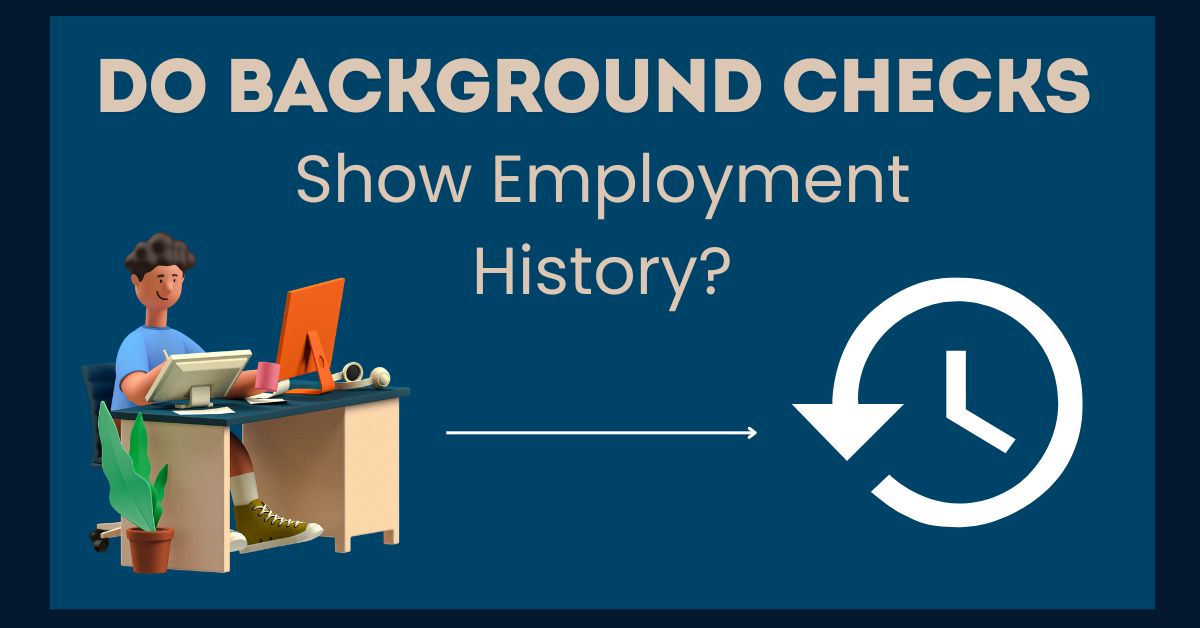Do Background Checks Show Employment History?
When you apply for a job, one of the most common steps during the hiring process is a background check. Employers use background checks to verify your identity, check your criminal record, and confirm your past employment. But a question many job seekers ask is: Do background checks show employment history? The simple answer is yes, but with some important details.
What Part of Employment History Is Included in a Background Check?
Most employment background checks include your previous jobs, job titles, dates of employment, and in some cases, your reason for leaving. However, background checks usually don’t show every job you’ve ever had. Instead, they focus on:
- Recent jobs (usually last 7-10 years)
- Jobs that are relevant to the position you applied for
- Positions you listed on your resume or job application
Here’s a table to make it clearer:
| Employment Detail | Usually Included | Notes |
|---|---|---|
| Job Titles | ✔ | Confirmed with past employers |
| Dates of Employment | ✔ | Start and end dates |
| Salary Information | ✘ | Rarely included |
| Reason for Leaving | ✔/✘ | Only if employer provides it |
| Performance Feedback | ✘ | Not included unless reference is contacted |
How Do Employers Verify Employment History?
Employers usually verify your employment history in two ways:
- Contacting Previous Employers: They may call or email your former employers to confirm your job title, duration of employment, and sometimes performance or behavior.
- Using Background Check Services: These companies use public records and employer databases to confirm your work history.
However, if a past employer has closed down or merged with another company, it may be harder to confirm your history through automated databases. In that case, providing old pay stubs, tax records, or reference letters can help.
Do Background Checks Show Every Job?
No, not every job appears in a background check. If you worked freelance, had a part-time job, or worked at a small business that doesn’t keep long-term records, it might not show up. Also, some background checks only go back a certain number of years, often 7-10.
So if you’re wondering whether a summer job from 15 years ago will show up, the answer is probably no—unless you include it on your resume.
What If There Are Gaps in Employment?
Employment gaps might raise questions during a background check. But they don’t automatically disqualify you from getting a job. Employers may ask you to explain those gaps—such as time off for school, caregiving, or illness.
Being honest is the best approach. If you explain the reason clearly, most employers will understand. It’s far better than hiding or lying about it.
What Happens If Your Employment History Doesn’t Match?
If your background check shows different information than what’s on your resume, it could raise a red flag. Employers might think you are being dishonest, even if the difference is a mistake.
Common mismatches include:
- Wrong job titles
- Incorrect dates
- Missing jobs
That’s why it’s important to be accurate when writing your resume or job application. Double-check your dates, company names, and positions. If you’re unsure, try looking at old emails, pay slips, or LinkedIn records.
Can You See What’s in Your Own Background Check?
Yes, you can! If a company plans to run a background check, they must tell you and get your written permission. You also have the right to request a copy of the background check report.
If you see any errors, you can dispute them. The background check company has 30 days to investigate and correct any mistakes. This is your right under the Fair Credit Reporting Act.
How Long Does Employment History Stay on a Background Check?
Most background checks cover the last 7-10 years of your employment history. This is especially true for jobs that involve finances, security, or working with sensitive information.
However, there is no exact time limit under federal law. Some employers—especially for high-level roles—might request more in-depth checks.
What Is Not Included in Employment Background Checks?
Not all job details are revealed during a background check. For example:
- Your salary is usually private unless you give permission.
- Job performance reviews are not included unless someone gives a personal reference.
- Job duties or projects you worked on are not listed.
- Interviews or rejections from other companies do not appear.
Background checks are mainly used to verify what you’ve claimed, not to go into every detail of your career.
Tips to Prepare for an Employment Background Check
To avoid surprises, here are a few helpful tips:
- Review your resume for accuracy. Check dates and job titles.
- Contact past employers if needed, to ensure they can confirm your work.
- Keep records like pay stubs, offer letters, or tax documents.
- Be honest if you’re unsure about a job or have employment gaps.
- Ask for your own background check if you’re curious what employers will see.
You can also read more about background checks on Wikipedia for a deeper understanding.
Final Thoughts
So, do background checks show employment history? Yes, but with limitations. They verify the jobs you listed on your resume, check for accuracy, and help employers trust what you’ve told them. Not every job shows up, especially freelance work or old part-time jobs, but recent and relevant employment is usually included.
Remember: the key is honesty. Don’t lie about your work history. If you’re upfront and your resume matches what a background check finds, you’ll make a better impression on future employers.
Also Read:
- Do Arrests Show on Background Checks?
- Does a Speeding Ticket Show Up on a Background Check?
- Will a Dismissed Misdemeanor Appear on a Background Check?
- How Long Does a Background Check Take?
Frequently Asked Questions
Do background checks show all past jobs?
Not always. Background checks may show jobs if the employer asks for employment verification. They confirm job title, dates, and company name. But not all jobs are listed unless they were officially reported or verified by previous employers. It’s always best to be honest on your resume.
How do employers verify my past work?
Employers usually use background check companies to contact your past employers or check payroll and tax records. They might confirm your job title, dates, and reason for leaving. In some cases, they also ask for documents like pay stubs or references to verify self-employment or freelance work.
What if my employment history is wrong?
If your background check report has wrong details, ask for a copy and check it carefully. You have the right to dispute mistakes under the Fair Credit Reporting Act. Contact the background check company and provide proof, like pay stubs or offer letters, to correct the error quickly.
Can I hide a job on a background check?
You can choose not to list a job on your resume, but if the employer asks for a full history or uses a background check, it might still appear. Hiding jobs can raise red flags. It’s better to explain short jobs or gaps honestly during your interview.
Will self-employment show on background checks?
Self-employment doesn’t usually appear in standard background checks because it’s not reported the same way as regular jobs. But you can prove it with tax records, business licenses, client invoices, or contracts. If you list self-employment, be ready to show documents that confirm your work experience.


